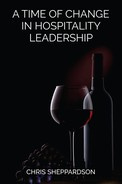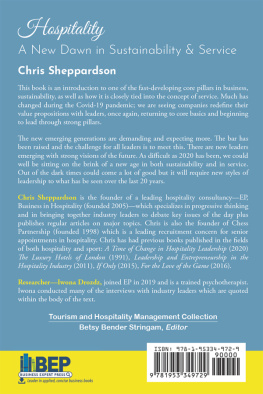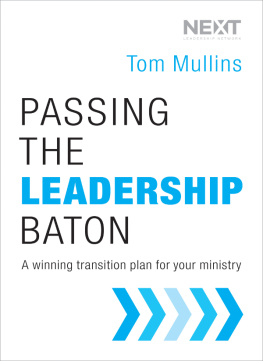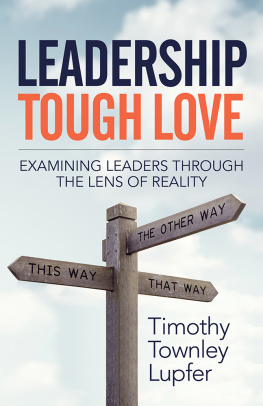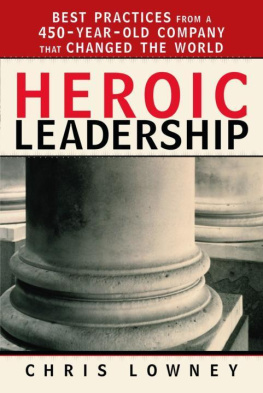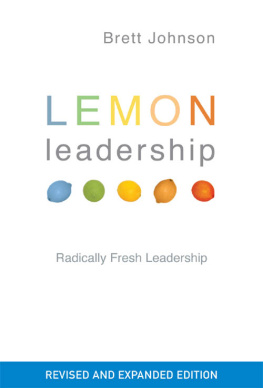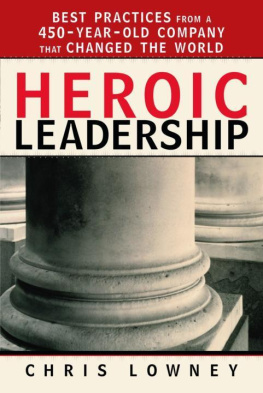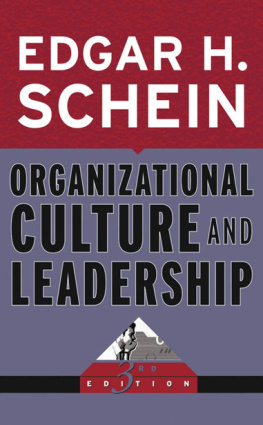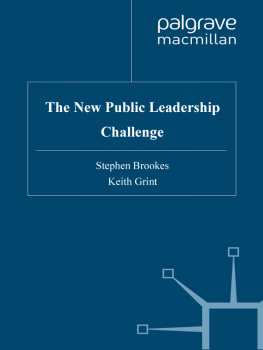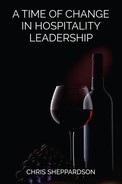
A Time of Change in Hospitality Leadership
A Time of Change in Hospitality Leadership
Chris Sheppardson

A Time of Change in Hospitality Leadership
Copyright Business Expert Press, LLC, 2020.
Cover image licensed by Ingram Image, StockPhotoSecrets.com
Cover and interior design by Exeter Premedia Services Private Ltd.,Chennai, India
All rights reserved. No part of this publication may be reproduced,stored in a retrieval system, or transmitted in any form or by anymeanselectronic, mechanical, photocopy, recording, or any otherexcept for brief quotations, not to exceed 400 words, without the priorpermission of the publisher.
First published in 2020 by
Business Expert Press, LLC
222 East 46th Street, New York, NY 10017
www.businessexpertpress.com
ISBN-13: 978-1-95253-854-4 (paperback)
ISBN-13: 978-1-95253-855-1 (e-book)
Business Expert Press Tourism and Hospitality Management Collection
Collection ISSN: 2375-9623 (print)
Collection ISSN: 2375-9631 (electronic)
First edition: 2020
10 9 8 7 6 5 4 3 2 1
Printed in the United States of America.
Thank you to my two girlsMimi and Chessiefor the inspiration theygive to me each day.
Kiplings If, which seems apt to quote when it comes to the topic ofleadership.
IF you can keep your head when all about you
Are losing theirs and blaming it on you,
If you can trust yourself when all men doubt you,
But make allowance for their doubting too;
.Or being lied about, dont deal in lies,
Or being hated, dont give way to hating,
And yet dont look too good, nor talk too wise:
If you can dreamand not make dreams your master;
If you can thinkand not make thoughts your aim;
If you can meet with Triumph and Disaster
And treat those two impostors just the same;
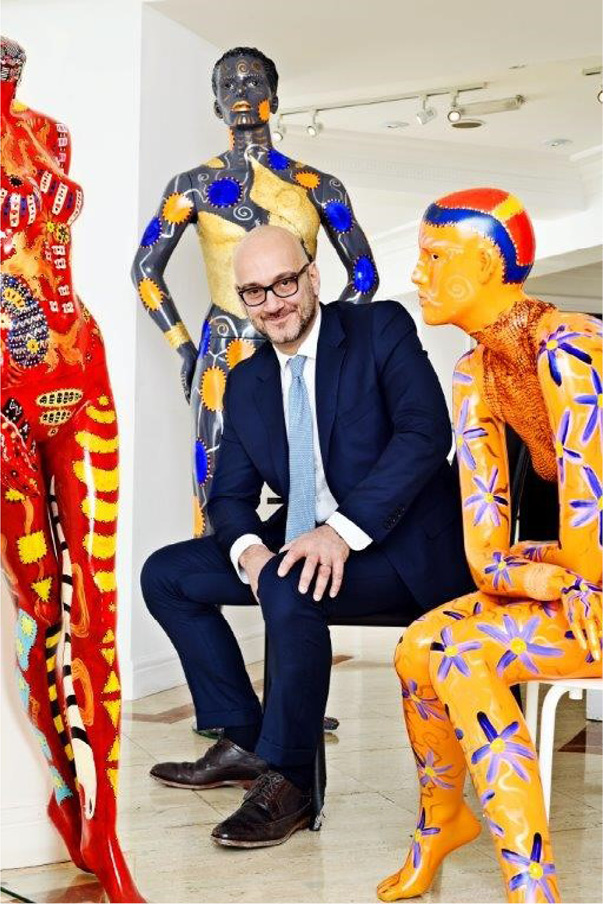
Gioele Camarlinghi, International Hotelier
Abstract
This book is an introduction to the challenge of modern leadership. Leadership has changed from the traditional perspective to be one which is far broader based, with more expected and asked. Leaders today need to consider their stakeholders, their employees, the communities and society in which they operate, the environment, culture and trends. The world has changed so much in the last ten years and many are lagging behind in their understanding. At the same time, we are about to witness a change in generations and the question arises as to whether industry is ready to empower and pass on the baton of leadership?
The main goals are to help students to understand what will asked of them as they become leaders. It is aimed to challenge perceptions, thinking and knowledge. Also, it aims to prepare students to identify how leadership has changed peoples lives and help develop critical thinking about the role of leaders in business and in society.
Keywords
chief executive officer (CEO); chief operating officer (COO); chief financial officer (CFO); chief marketing officer (CMO); human resources director (HRD); managing director (MD); millennials; baby boomers; silent generation; Gen Z; artificial intelligence (AI); C-suite; diversity & inclusion (D&I); mergers & acquisitions (M&A); sustainability
Contents
) Sir Winston Churchill
The years of leadership by the baby boomer generation are moving toward their natural conclusion. It will result in a shift from the one of the most successful business generations ever to that of the millennials generation: a generation that has been heavily critiqued and is seen to be unproven, untested. Yet there this an exciting prospect as they are progressive and aspiring to see a better world. They have a belief in sustainability in communities, in culture, in business, and environment. Both generations should work together to ease the way, but the chasm between the generations is currently too large. Strangely enough, the differences are not as large as they may appear. The millennials, in truth, are only a reflection of the baby boomers who have heavily influenced them. Both generations began their journeys with strong ideals. The baby boomers compromised in line with the challenges that they faced, but still raised another generation stressing the ideals that they still held close to them, so a bridge should be able to be built. How can this be achieved? by Chris Sheppardson, Edited by Lauran Bush MA, Research support by Iwona Drozdz, 2020
It is only correct that I acknowledge a number of their support, guidance and friendship during the writing of this book including:
- Abigail Tan, CEO, St.Giles Hotel Group
- Adam Elliott, Co-Founder, Paragon Hospitality
- Michael Gray, former VP for London with Hyatt
- Ken McCulloch, MUH Hotels
- Bob Cotton OBE
- Gioele Camarlinghi, hotelier
- Marco Truffelli, hotelier
- David Coubrough, Chair, Royal Academy of Culinary Arts
- Nick Metcalfe, Chess Partnership
- Russell Kett, Chairman, London Office, HVS
- Ramesh Vala OBE, Global Ambassador, Ince
- Kevin Watson, Managing Director, Amadeus
- Frank Bothwell, Founder, Thomas Franks
- Alex Buchanan, Founder, Catering Scotland
- Karen Friebe, Partner, Bird & Bird
- David Read, Chairman, Prestige Purchasing
- Doug Tetley, MD Europe, Delaware North
- Hamish Cook, Executive Director, En-Route International
- Gavin Brooking. Hotel Advisor and consultant
- Donald Sloan, Chair, Oxford Cultural Collective
- Kathryn Pretzel Shiels, Consultant
- Marianna Alfa, Founder, Blossom Hospitality
- John Harris, Co-founder, Confab
- Vicky La Trobe, Consultant
Thank you to all the above and to all those interviewed during the process
from all across the world.
Our thanks.
The Time for New Leadership in Hospitality
The most dangerous leadership myth is that leaders are bornthat there is a genetic factor to leadership. Thats nonsense; in fact, the opposite is true. Leaders are made rather than born (). Warren Bennis
There are many who argue that leaders are born, that leaders will possess the natural attributes to be destined for the role. It is true that there are those who are very naturally suited to leadership, and in a simpler age, this ethos had more truth in it. It is an old-fashioned perspective and has less substance for todays world. Everyone has a view upon leadership, but very few understand it.
Leadership today is not as simple as being solely about character. The world is evolving at such pace that leaders need to be prepared to live in a world which will constantly be uncertain and that will be almost consistently vulnerable. Some will argue that 9/11 changed the world. Others that the artificial intelligence (AI) revolution and the globalization attached changed traditional models and approaches. The pace of change that has been generated has certainly created new possibilities. Many will argue that the demands of shareholders have seemed to be ever-more demanding and have placed increased pressures upon leadership teams.
Society too has changed, and the emerging generations have grown up in arguably the safest ever environment, which has naturally meant that they too will think differently to previous generations. In previous eras, making a good living was the primary objective. The old saying that mortgages make mice of men existed for good reason. Many talk today about the fear of failure, but in previous generations, one expected to compromise on ones aspirations and hopes. Past generations were focused on lower expectations. One leading Industry CEO started his career as a chef so as to escape the fate of his brothers in going down the old coal mines. He was driven by a desire to build a life as far away from having to face that choice and today, having been a very successful leader, he sees his wealth as the basis for his children to have security and choice; to never have to face the choices he had to make. This is not an isolated example. The greatest success of the baby boomer generation has lain in building wealth and safe environments for their children to have the freedom to aspire for greater. The irony, of course, is that this has also created the fault lines and tensions that many have struggled to understand.

